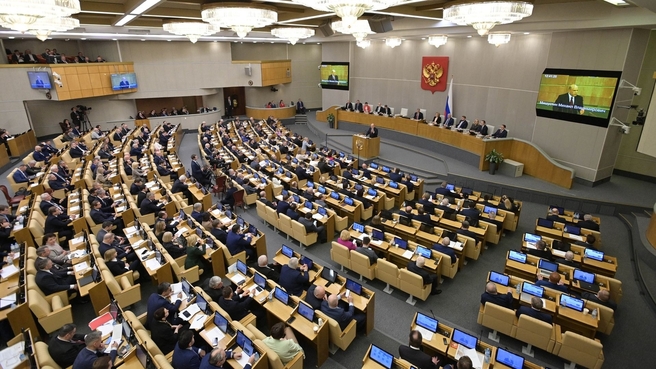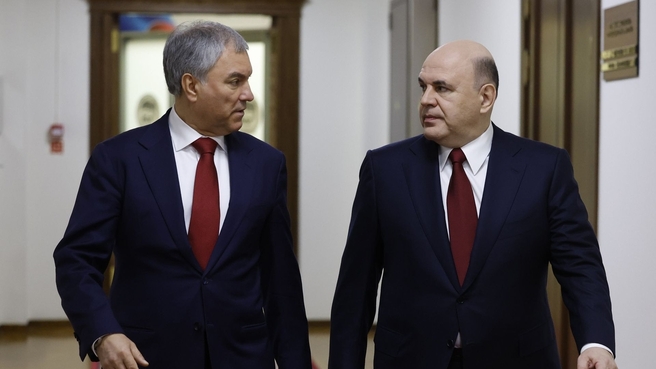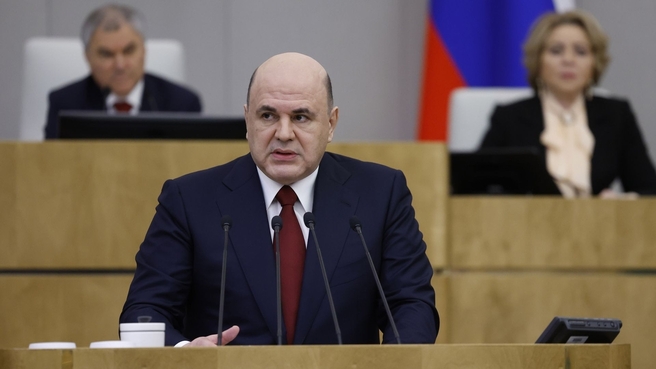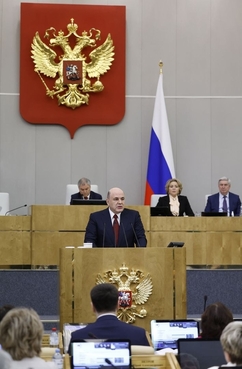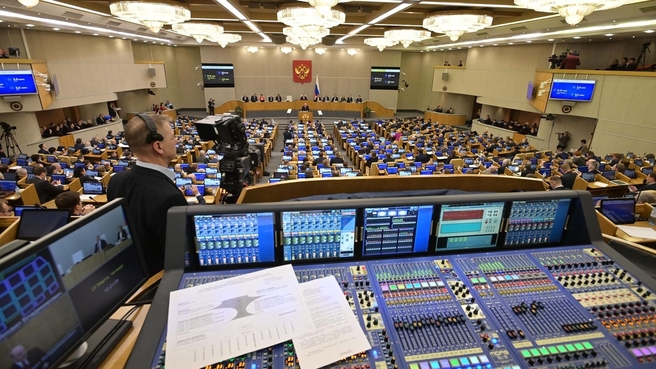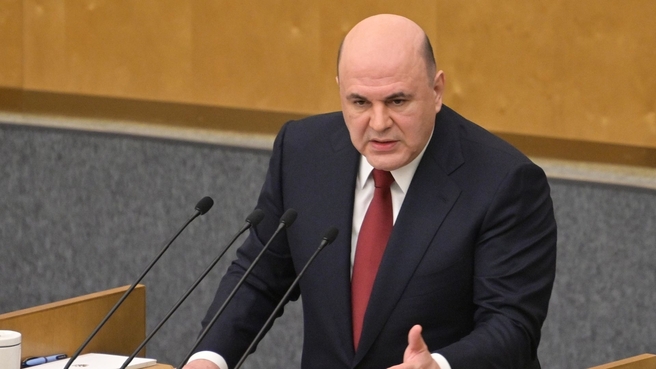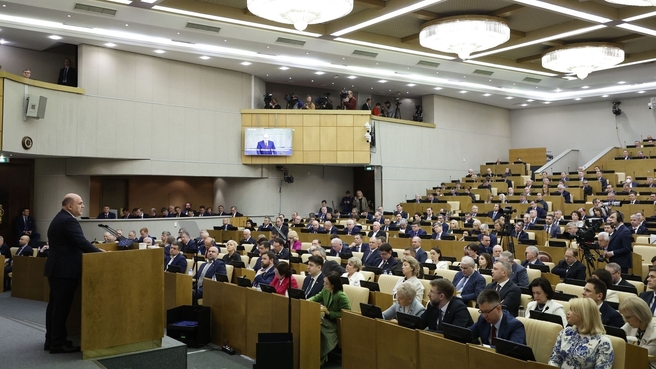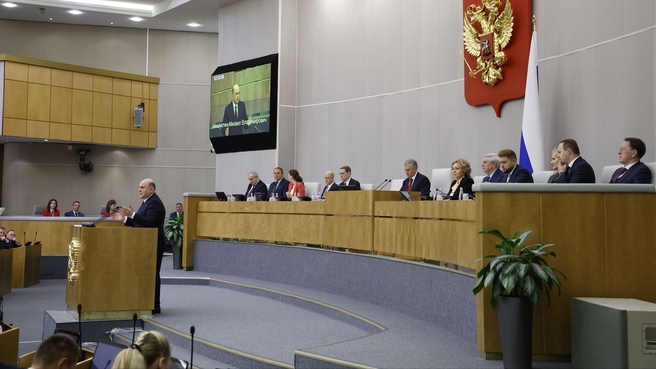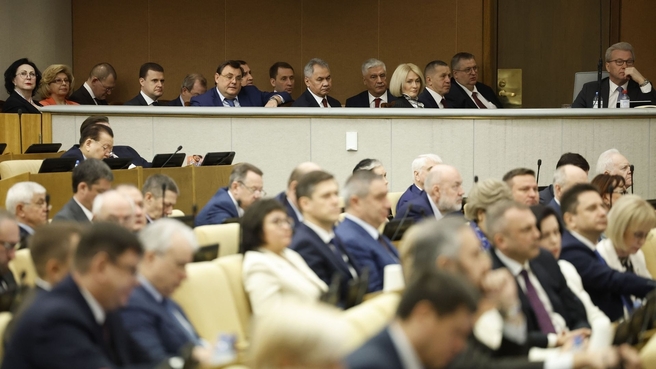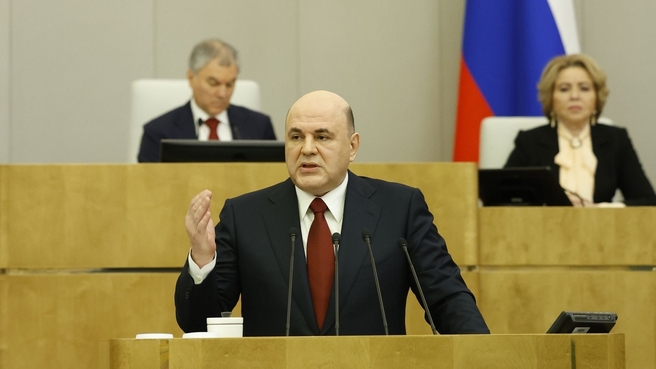
The Government’s annual report to the State Duma
Mikhail Mishustin and State Duma Speaker Vyacheslav Volodin
“The Government of the Russian Federation: <…> shall submit to the State Duma annual reports on the results of its work, including on issues raised by the State Duma” (The Constitution of the Russian Federation, Article 114, Paragraph 1a).
The Government’s annual report to the State Duma
Excerpts from the transcript:
Mikhail Mishustin: Mr
Volodin, Ms Matviyenko, Deputies of the State Duma, Colleagues,
Today, I am presenting the fourth
report about the Government’s activities. We have discussed part of its topics
in detail at meetings with the parliamentary parties.
I will focus on the results we
achieved last year, and on our future development priorities.
I think there is no need to
explain in this hall the conditions in which all of us had to work. A sanctions
blow was delivered against Russia, one unequalled in force in recent
history.
In the beginning, the West
attempted to assure everyone that the sanctions were not directed against
Russian citizens. There were no particular illusions on this score even then,
but now even a person unversed in global politics is aware that it is the
Russian people who are their main target.
They
tried to bring down our financial
system so that people would not be able to use bank cards. They tried to
disrupt economic and business ties. They made their own companies leave the
Russian market with great losses, so that the goods we are used to would
disappear from the shelves, and to throw out Russian employees of those
companies on the street and deprive them of income. That is, the people whose
hard work created their multibillion profits. They wanted to provoke mass
unemployment and drastically decrease the quality of life in our country.
They
stopped at nothing: they blew up the Nord Stream gas pipelines, arrested bank accounts,
and banned Russia from the international payments system. They tried to block all
banking operations and all other economic activities.
Remember
what they said about the sanctity, the inviolability of private ownership. But
the property and money of our people and companies are being arrested just
because they are from Russia.
Last
year, we had to respond to challenges created by yet another package of
sanctions almost every day. They required a prompt response and a constant
search for an answer to the question: what will happen next? We were working on
countermeasures to protect the people, while at the same time laying the
foundation for the ability to move forward, ensure economic growth and reach
the national targets set by the President.
We
were doing this together with you. All branches of power, regardless of the
level – federal, regional and local – worked efficiently to implement tasks that
were crucial for the state. Thanks to our coordinated efforts led by the
President, we managed to deal with the most complicated issues of the past
year.
I
want to thank the State Duma, the Federation Council, regional heads and all
people of Russia who helped in each region and each municipality. We have
overcome all challenges together.
Last
spring, analysts predicted a double-digit fall of the Russian GDP. But we
survived.
It
was not easy. The decline, inevitable in this situation, was quite moderate.
However, we managed to bring the economy back to the growth trajectory.
Now,
even some international organisations are saying that we will see growth in
2023 and leave behind the developed economies in terms of GDP growth in 2024.
This
is not the first time that our economic system has shown such flexibility. In 2020,
amid the CIVID pandemic, it showed that it was more stable than had been
expected. We overcame that crisis more confidently than many Western countries
which saw a bigger drop of GDP.
In
March 2022, at the instruction of the President, the Government and the Bank of
Russia developed measures to stabilise the situation in the financial sector.
Due
to the prompt and precise actions of the Central Bank leadership, the work of lending
institutions and currency and stock markets was normalised. We avoided the
external blocking of transactions inside the country to a large extent due to
the existing national settlements infrastructure. The replacement of the dollar
and euro in our foreign trade has allowed us to expand operations with friendly
states.
Payments
for goods and services and money transfers are being made as usual. All bank
cards in Russia continue working. We managed to alleviate the inflation
pressure as well and maintain the stability of the banking sector.
Our joint
decisions formed the basis of a priority action plan to ensure economic
development in the face of external sanctions pressure.
It included more
than 300 measures which had been selected out of 33,000 proposals received from
all over the country. By June, the impact of negative factors had already markedly
decreased, and we approached the third quarter with a certain margin of safety.
Significant
funds were earmarked for the implementation of the plan. Direct support from
the budget and the National Welfare Fund alone amounted to 1.5 trillion roubles.
Almost 4
trillion roubles were allocated under various programmes for concessional
lending to companies, and that’s not counting VEB.RF guarantees for about 1
trillion roubles. We also restructured loans at floating rates and under the
Bank of Russia programmes amounting to about 6 trillion roubles.
The
implementation of these measures made it possible to promptly resolve the most
important tasks.
In implementing
them, we relied on primary data from all sources. We used reliable feedback
from people and businesses, which the President always reminds us to fall back
on. We created a new platform management model.
Modern
information technologies enable us to pursue a coordinated policy in all
sectors and the social sphere and support their development using budgetary
funds.
We work in close
coordination with the State Council, the Presidential Executive Office, the
Bank of Russia, public associations, companies and corporations.
We made it much
easier to do business.
Income tax rates
have been lowered for companies in a number of sectors. The cadastral value of
property for calculating payments to the state was frozen. Deferments were provided
on payment of insurance premiums and VAT was reduced to zero for hotel
services.
In addition, we
helped with working capital, primarily through a line of preferential loan
programmes. More than 1.5 trillion roubles were issued to major companies in industry,
agriculture, transport, energy and information technology.
Thanks to these
steps, businesses have been able to free up resources and channel them into
restructuring their production and logistics chains and adapting to the new conditions.
More than 200
licences and permits can now be processed through the public services portal
and, importantly, it can be done much faster than before, with less paperwork.
More to be posted soon…
